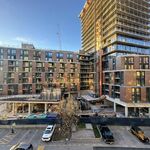Guelph Mercury
By
Doug Hallett
The 2017 city operating budget proposed by city hall staff doesn’t include a restoration of 20-minute peak-period bus frequency during four months next spring and summer, and some city councillors aren’t happy about it.
“I think it was generally seen as a bad decision, a failure,” Coun. Mike Salisbury said about council’s decision last December to save money by eliminating 20-minute bus frequency during peak weekday travel periods from early May to early September of 2016.
The change meant buses ran every 30 minutes all day long. But in June, council authorized extra spending to add extra buses on some routes starting July 4, in order to help quell a chorus of complaints about the service cuts that started in May once U of G students left the city.
Running these “helper buses” for a couple of months cost the city $75,000, and this amount of money is included in the 2017 budget for the same purpose, said Colleen Clack, the city’s deputy CAO of public services.
However, other than this, the cuts to Guelph Transit service included in the city’s 2016 operating budget will remain in the 2017 budget, she told a Nov. 10 council meeting on the city’s 2017 operating budget. It would cost $1.3 million to reverse the bus service cuts made in the 2016 budget, which would push up 2017 property taxes, she said.
The helper buses “alleviated much of the concern” about the service reductions that started in May, by allowing people to make their connections at a 30-minute bus frequency, Clack said.
Coun. Christine Billings pointed out that the $75,000 for helper buses covered only a couple of months, and she asked how this sum would be enough to cover four months in 2017. Clack replied that city officials think they can accommodate four months of operating helper buses next spring and summer within the operating budget.
Clack fielded all of council’s questions about the Guelph Transit budget because Phil Meagher was fired as transit’s general manager in October after a little more than three years in the job.
Salisbury said staff’s plan amounted to “institutionalizing the Band-Aid solution” provided by the helper buses for two months this summer. He asked for staff to give council a breakdown of options for moving towards improving spring and summer bus service next year, and Clack said this information will be provided.
Coun. James Gordon also expressed dissatisfaction with staff’s proposal for 2017 bus service, saying it seemed to him to be “counter-intuitive” given the housing-density pressures the city is facing and a resulting need for better transit service.
The draft 2017 operating budget proposed by staff, amounting to $221.9 million, calls for a net increase of 1.98 per cent in the tax levy over 2016. This would increase the city’s portion of property tax bills by $65 during 2017 for the average residential property valued at $315,764, the city says.
The 2017 budget is proposed to increase by $1,014,678, or 0.47 per cent, for “controllable” budget adjustments by city departments, a city staff report says. “Departments were given a target of 0.75 per cent of controllable expenses and delivered at 0.47 per cent,” it says.
The budget is also proposed to go up by 0.89 per cent for “uncontrollable” adjustments, 1.03 per cent to pay for “prior council decisions,” 0.58 per cent to bring the 2017 budget in line with previous “actual” spending levels, and 0.45 per cent for higher spending by local boards and shared services.
However, assessment growth will reduce the 2017 budget increase by 1.44 per cent, the report says.
The 1.98 per cent hike in property taxes in 2017 comes by adding or subtracting all these numbers.
City staff are recommending several hirings as budget expansions in 2017, which would add an additional 0.6 per cent increase to the tax levy above the 1.98 per cent level, council was told.
Staff aren’t recommending further service reductions to bring down the tax levy in 2017, said city CAO Derrick Thomson. In light of the new process at city hall for thoroughly reviewing city services, “we believe the prudent thing to do would be to have that take its course,” he said.
Public delegations giving opinions on the city’s 2017 budgeting will be heard by council at a Nov. 30 meeting starting at 6 p.m. Council is to finalize the budget on Dec. 7.





